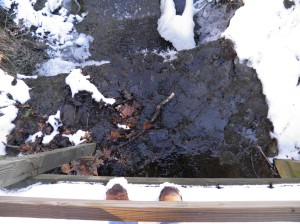 The meal is over. The washing of the “good” dishes is complete. And the post-turkey somnolence has hit. Various family members have found couches on which to recline. I love the tradition of Thanksgiving. What a blessing to pause for one day to be thankful, to be grateful not just for the “things” of life but the people, past and present, who have made a positive impact on me. It’s an excuse to slow down enough to sit with each other awhile and enjoy our favorite Thanksgiving comfort foods together. At our house this means mashed potatoes, candied yams, cornmeal dressing, green bean casserole, corn pudding, apple salad with marshmallows and rhubarb/strawberry pie. Pumpkin pie was substituted this year by Spiced Pumpkin Latte Cheesecake. Decadent indeed! And of course, one must not forget turkey.
The meal is over. The washing of the “good” dishes is complete. And the post-turkey somnolence has hit. Various family members have found couches on which to recline. I love the tradition of Thanksgiving. What a blessing to pause for one day to be thankful, to be grateful not just for the “things” of life but the people, past and present, who have made a positive impact on me. It’s an excuse to slow down enough to sit with each other awhile and enjoy our favorite Thanksgiving comfort foods together. At our house this means mashed potatoes, candied yams, cornmeal dressing, green bean casserole, corn pudding, apple salad with marshmallows and rhubarb/strawberry pie. Pumpkin pie was substituted this year by Spiced Pumpkin Latte Cheesecake. Decadent indeed! And of course, one must not forget turkey.
But I have to say that I’m not much of a fan of the turkey. Don’t get me wrong. I love to eat turkey but there’s something about the process of cooking the turkey that is tedious. The instructions on the turkey always say to thaw it in the refrigerator several days before cooking. Even if I diligently follow these directions, it seems that the center of the turkey is always still frozen. I want to know why the neck and other sundry parts are put into the center cavity. No one I know ever uses these parts but they are a devil to get out. Next year maybe I’ll buy a fresh turkey. I wouldn’t have an issue with thawing it and what to do with the “extra parts”.
We have a turkey farm just down the road from our house but they don’t sell directly to the consumer. I often walk by the facility and see all the turkeys looking out at me. Poor things! At least they’re not in cages. They can mill around among hundreds of their friends. This is all they have ever known. I don’t believe they are treated cruelly but they have never really tasted freedom. Most of us, if asked, would probably agree that it would be better for the birds to be “free range” rather than confined.
The question of whether it is better for animals to be confined or free was surprisingly discussed at length in the book, “The Life of Pi.” The movie never really attended to this but in a chapter of the book, the main character, Pi, recalled his experience of being part of a family who owned a zoo. He recognized that most people thought it was cruel to confine an animal. But he had a different view. The “cage” provided the animals with safety. As long as they had room to roam in their enclosure, they would make this area their “territory.” The cage provided protection from predators. Animals in the wild live with constant threats from predators but those in zoos live comfortably without this fear.
When I first read this, I saw it as a thought provoking view on the topic. The animals in the zoo are essentially given “caged comfort.” They have no need to worry about their next meal or whether they will be the next meal for a predator. Freedom is traded for comfort. The animals have no choice in the matter but as a society, are we not guilty of giving up our own freedoms for comfort? I see us relinquishing more and more of our individual freedoms to be taken care of by our government. Instead of taking personal responsibility for our problems, we seek government solutions. I would be the first to agree that government has a purpose. Rules must be set up to maintain a civil society. However, we now expect much more than this. Freedom is risky. We must depend on individuals to step up to help the poor, feed the hungry and care for the orphans. Unfortunately many individuals have stepped back and expect that our taxes will take care of these people. By doing this we distance ourselves from the needy and only widen the gap between rich and poor. There are still groups within my own community that reach out to the needy taking personal responsibility for their well being. We have Lunch Club at my church that serves meals to the children of Sheridan five days a week all during the summer and on holiday breaks from school. We know that government food stamps and welfare can’t provide what is really needed. The love and understanding shared when one person reaches out to help another person is lost when we depend on government to take care of our poor.
My prayer on this Thanksgiving is that we as Americans truly recognize and cherish the freedoms we have been given. Many individuals over the decades have died to preserve this freedom for us. We must not take it for granted or give it away easily. We must freely take a stand to care for each other, not depend on our government to do it for us.

